
Publisher:
Bonnie King
CONTACT:
Newsroom@Salem-news.com
Advertising:
Adsales@Salem-news.com

~Truth~
~Justice~
~Peace~
TJP
Jan-09-2012 18:35

 TweetFollow @OregonNews
TweetFollow @OregonNews
The turbulent 2011 at a glance
Kourosh Ziabari Salem-News.comIt was a year of wars, revolutions, threats and failures.
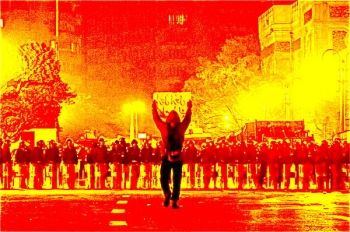 The Arab Spring of 2011 |
(TEHRAN) - 2011 was a turbulent year for the world. With chained revolutions in the Arab world, mounting financial crisis in Europe and the unprecedented wave of protests and mass demonstrations in the U.S. against the corporate system of the government which has long swallowed the rights of the defenseless majority of the people voraciously, one can call 2011 the year of global unrest and tumult.
For Iran, 2011 was also a challenging year. Benefiting from the all-out backing of the Western mainstream media, the apartheid regime of Israel for several times renewed its hawkish war threats against the Islamic Republic and repeatedly used an aggressive rhetoric against the people of Iran, threatening them with various military options which the United States and certain European governments embraced willingly and enthusiastically.
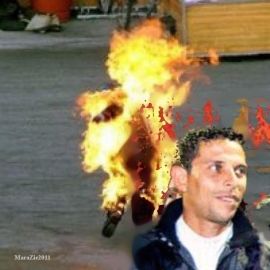 Mohamed Bouazizi Phyoto: jamesstrock.com |
In Tunisia and after Bouazizi burnt himself before the mayor's office, people started to sympathize with him and his family and held funeral processions for him. These small gatherings began to expand explosively and after a short time, turned into massive demonstrations against the uncontested 23-year rule of Zine El Abidine Ben Ali whose accumulation of illegitimate wealth and what his opponents called his family's Mafia rule had infuriated the oppressed, pauperized people.
According to The Daily News Egypt, "President Ben Ali's extended family is often cited as the nexus of Tunisian corruption," the U.S/ embassy in Tunis said in a June 2008 cable recently revealed by the WikiLeaks website and widely read in Tunisia.
The Egyptian paper's report titled "Ben Ali's hated in-laws looted Tunisia's wealth" adds that the family of Ben Ali's second wife Leila Trabelsi is considered as a quasi-mafia by the Tunisian people. Leila Trabelsi has 10 siblings and several nieces and nephews and along with Ben Ali's own 7 brothers and sisters, they accumulated a large amount of capital since the ousted Tunisian ex-president married Leila in 1992. As said by Nicolas Hibou, a researcher at the National Scientific Research Centre (CNRS) in Paris, the Family used a variety of methods to build a stranglehold on Tunisian economic life.
Daily Telegraph reported on January 9, 2011 that according to independent inspectors who investigated Ben Ali's family wealth, it was revealed that he had hoarded USD 5 billion for his family during his 23-year rule, along with other luxury properties including a sumptuous villa in Westmount, Quebec, an apartment worth Euro 37 million in the famous Paris street of Rue du Faubourg Saint-Honoré and a lavish apartment in Courchevel ski resort in the Alps. Le Monde Diplomatique reported that Leila Ben Ali, before fleeing to Saudi Arabia with his husband, referred to the Tunisian Central Bank and received a 1.5-ton ingot of gold worth Euro 45 million. It's also said that Ben Ali owns a Falcon 9000 jet in the Geneva International Airport.
At any rate, the Tunisian people joined their efforts and put an end to Ben Ali's corrupt regime, toppling him after a set of massive demonstrations and this marked the beginning of what was later popularly called the Arab Spring.
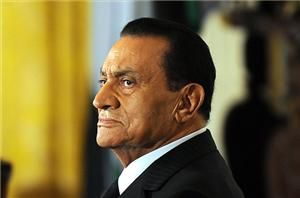 Hosni Mubarak - Wikipedia photo |
The next phase of revolutionary wave in the Arab world took place in Egypt, where the browbeaten people, overfed with the three-decade rule of Hosni Mubarak stormed into the streets and brought into existence an impeccable revolution. The empty-handed Egyptian people were at one side of the conflict and the stronghold of Hosni Mubarak, the U.S.-backed dictator on the other side.
There were rumors that Mubarak intended to hand over the seat of presidency to his son, Gamal, after stepping down as the fourth president of Egypt and this was something intolerable for the people of Egypt who were surprisingly not directed and guided by a specific revolutionary leader in their popular uprising. 18 days of incessant massive demonstrations which resulted in the formation of 2011 Egyptian Revolution marked the closing stages of Hosni Mubarak's 30-year rule whose government's cordial ties with Israel and the United States was a source of anger and dissatisfaction for the ordinary Egyptians. Police brutality, state of emergency laws, lack of free elections and freedom of speech, unrestrained corruption of the ruling elite, unemployment, food price inflation and low wages were among the other grievances of the demonstrators who, inspired by the people of Tunisia, wanted to draw an end to Mubarak's dictatorship.
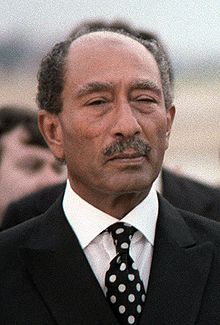 Anwar Sadat |
After Mubarak officially resigned on February 11 amid the rage and fury of the revolutionary people and transferred power to the Supreme Council of the Armed Forces, people found one of their main objectives realized, that was the overthrowing of Hosni Mubarak, the U.S.-backed dictator of Egypt. Based on the decree of a general prosecutor who ordered the detainment of Mubarak and his sons on April 13, the trial of Egypt's ex-president on charges of premeditated murder of peaceful protesters during the revolution, financial corruption, abuse of power and his alleged role in the assassination of his predecessor Anwar Sadat began.
During the course of revolution when the Egyptian people gathered in the Tahrir Square of Cairo, the forces of Mubarak killed at least 846 people and injured more than 6,000, committing an unmistakable act of violence and crimes against humanity.
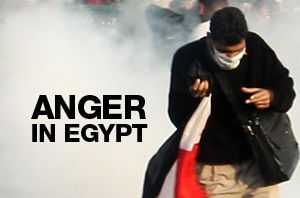
It was very interesting that the Egyptian revolutionaries were not simply dissatisfied with the domestic policies of Mubarak, his family corruption and his seemingly unending rule, but his foreign policies including a close alliance with the United States and supporting the Israeli regime in its suppression of the Palestinian people, especially through continuing the blockade of Gaza Strip were challenged by the angry protesters. On September 9, 2011, thousands of Egyptian protesters gathered outside the Israeli embassy in the Giza district of Cairo, broke down a wall protecting the embassy compound and brought down an Israeli flag installed atop the embassy building, setting it alight. Following the attack, 85 staff members of the embassy and their families returned to Israel and the Egyptian army declared a state of emergency.
This incident marked a new phase in the bilateral relations between Egypt and Israel, and a growing apprehension that the new government of Egypt may revoke the Camp David Accords and stop selling gas to Tel Aviv began to occur among the Israeli politicians. At any rate, the revolution of the Egyptian people is still underway with people demanding the dissolution of the military junta which rules the country and the people believe is a remnant of the Mubarak's era. The Egyptian revolution was among the most important events taking place in 2011 and attracted the attention of international community, media, political figures and academicians to a great extent.
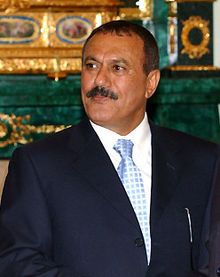 Ali Abdullah Saleh - Wikipedia |
Other countries in the Middle East experienced revolutionary protests in 2011 as well. In Yemen, a popular uprising against the tyrannical rule of Ali Abdullah Saleh who has been the unchallenged President of Yemen since 1978 emerged which was responded by the forceful and violent reaction of the mercenaries of Saleh. According to Allvoices.com, the forces of Ali Abdullah Saleh killed more than 1,870 people in the streets of different cities in Yemen, and this bloody massacre of the protesters who demanded the resignation of Ali Abdullah Saleh received the passive and inert reaction of the international community, especially the relevant parties such as Arab League, the Persian Gulf Cooperation Council and the United Nations Security Council. No single resolution was passed in the UN to condemn the crackdown on the peaceful protesters and the U.S., a close ally of Ali Abdullah Saleh, hypocritically turned a blind eye to the mass killing of the innocent, unarmed civilians in Yemen which is continuing up to now.
Another important event in 2011 was the capturing and killing of Muammar Gaddafi, the unflappable and unbeatable dictator of Libya who finally succumbed to the armed forces of the National Transitional Council of Libya and was killed on October 20, 2011 after 9 months of bloody battle in the Libyan Civil War of 2011. This was actually a tragic end to four decades of ruling over a country whose people didn't want the dictator anymore. Civil war in Libya was followed by the wave of revolutionary protests in Tunisia, Egypt, Yemen and Bahrain and started with peaceful demonstrations and rallies in the major cities such as Benghazi, Sirte and Tripoli. The forces of Gaddafi responded to the protests aggressively and killed fourteen protesters during the first day of the protests on February 18. Clashes between the protesters unhappy with the despotic rule of Gaddafi continued and with the increasing of the number of deaths, UNSC authorized a no-fly zone over Libya and NATO military coalitions began to intervene. There are varying figures as to the number of total deaths in the civil war, but the National Transitional Council believes that the forces of Gaddafi and NATO killed more than 25,000 Libyans from the beginning of the uprising in the North African country.
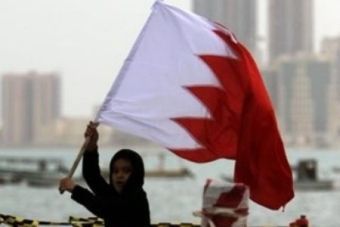 |
The Bahrain revolution was the other remarkable news of the year 2011. The Shiite people of Bahrain who had been subject to state discrimination for many years and were deprived of their rudimentary rights such as the right of holding religious congregations or attending mosques, took the example of Tunisia and Egypt and revolted against the dictators ruling their country to demand reforms and changes in the way the Al Khalifa regime was handling the country's affairs. The Bahraini dictators couldn't tolerate the upheaval of the people and reacted frantically. They invited armed forces from Saudi Arabia and United Arab Emirate to help them in cracking down on the protesters and in a short period of time, arrested hundreds of peace activists, killed tens of innocent and unarmed civilians and blocked national access to internet in order to prevent the revolutionaries from finding a way to get united and organize demonstrations and protests. Bahrain, home to the U.S. Fifth Fleet in Persian Gulf, received the tacit support of the U.S. and UK and is still continuing its belligerent clampdown on the protesters. Now, hundreds are in prisons, several others have lost their jobs and many others have been sentenced to execution, life-term prison and heavy fines.
But the repercussions of the Arab Spring were not only felt in the Middle East and North Africa, but the United States and Europe as well. In what many political experts consider a replication of the Arab Spring by the American people, the Occupy Wall Street movement was shaped to protest the inadequacy and insufficiency of the capitalist system in the United States and the government's accumulation of the capital, its failure in creating jobs for the jobless and eradicating the growing poverty. OWS movement can be called the Western version of the Islamic awakening in the Middle East in which thousands of annoyed, exasperated Americans took part. The protesters selected the slogan "We are the 99%" for themselves to express their dissatisfaction with the domination of the ruling 1% over the financial resources of the country and their mismanagement of the economy which resulted in the most devastative economic crisis since the Great Depression.
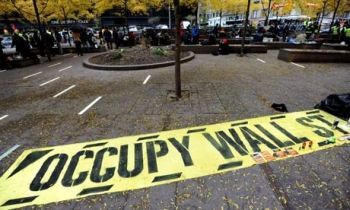 Courtesy: guardian.co.uk |
Since September 17 that the protests and gatherings in the Zuccotti Park started, every day tens of protesters were arrested and beaten by the U.S. police forces and today, there's no reliable source showing the total number of arrests; however, according to some unofficial figures, more than 5,000 American protesters have been incarcerated up to now. Some political commentators believe that the Occupy Wall Street movement brought the U.S. government to the brink of downfall and was more of an anti-government revolution in which people protested not only the economic policies of the White House, but the warmongerings of their government in different parts of the world, as well.
Public intellectuals and authors such as Noam Chomsky, Paul Krugman, Joseph Stiglitz, Margaret Atwood, Neil Gaiman, Alice Walker and Jimmy Wales were among the famous people supporting the Occupy Wall Street movement.
Other important incidents also took place in 2011 which are worthy of mention. The United Kingdom anti-austerity protests and the brutal, repressive crackdown of the police on the peaceful protesters, the economic crisis in the Eurozone and the unprecedented fluctuations of the price of gold and oil can be considered as the other remarkable events in 2011.
For Iran, also, 2011 was a tough year. The mischievous alliance of the U.S., UK and Israel designed various scenarios and plots for Iran to debase the Iranian government and demoralize the Iranian people. The Saudi envoy assassination plot allegation, repeated threats of military strike and consecutive rounds of economic sanctions against Iran's banking and oil sector were the stratagems which the U.S., UK and Israel planned for Iran. However, the Iranian nation exemplarily resisted the pressures and survived the threats and is hopeful that the future will bring brilliant opportunities for its prosperity and success.
However and so forth, 2011 was a year full of turbulence and clamor for the international community. It was a year of wars, revolutions, threats and failures. One should wait to see whether 2012 will be a continuation of the crises which happened to our world or we can once again experience peace, tranquility and stability.
 Kourosh Ziabari is an Iranian media correspondent, freelance journalist and the author of Book 7+1. He is a contributing writer for websites and magazines in the Netherlands, Canada, Italy, Hong Kong, Bulgaria, South Korea, Belgium, Germany, the U.K. and the U.S. He was once a member of Stony Brook University Publications’ editorial team and Media Left magazine’s contributing writer, as well as a contributing writer for Finland’s Award-winning Ovi Magazine.
Kourosh Ziabari is an Iranian media correspondent, freelance journalist and the author of Book 7+1. He is a contributing writer for websites and magazines in the Netherlands, Canada, Italy, Hong Kong, Bulgaria, South Korea, Belgium, Germany, the U.K. and the U.S. He was once a member of Stony Brook University Publications’ editorial team and Media Left magazine’s contributing writer, as well as a contributing writer for Finland’s Award-winning Ovi Magazine.
Kourosh Ziabari was named the winner of winners in the category of media activities at the National Organization of Youths festival. He was honored by the Iranian President Mahmoud Ahmadinejad, receiving the honorary mention signed by him and the silver medal of Iran's Superior Youth. The media activities category did not award the Gold and Bronze medal to any participant.
As a young Iranian journalist, Kourosh has been interviewed and quoted by several mainstream mediums, including BBC World Service, PBS Media Shift, the Media Line network, Deutsch Financial Times and L.A. Times. Currently, he works for the Foreign Policy Journal as a media correspondent. He is a member of Tlaxcala Translators Network for Linguistic Diversity and World Student Community for Sustainable Development. You can write to Kourosh Ziabari at: kziabari@gmail.com
Articles for January 8, 2012 | Articles for January 9, 2012 | Articles for January 10, 2012




Quick Links
DINING
Willamette UniversityGoudy Commons Cafe
Dine on the Queen
Willamette Queen Sternwheeler
MUST SEE SALEM
Oregon Capitol ToursCapitol History Gateway
Willamette River Ride
Willamette Queen Sternwheeler
Historic Home Tours:
Deepwood Museum
The Bush House
Gaiety Hollow Garden
AUCTIONS - APPRAISALS
Auction Masters & AppraisalsCONSTRUCTION SERVICES
Roofing and ContractingSheridan, Ore.
ONLINE SHOPPING
Special Occasion DressesAdvertise with Salem-News
Contact:AdSales@Salem-News.com
googlec507860f6901db00.html
Terms of Service | Privacy Policy
All comments and messages are approved by people and self promotional links or unacceptable comments are denied.
[Return to Top]
©2026 Salem-News.com. All opinions expressed in this article are those of the author and do not necessarily reflect those of Salem-News.com.